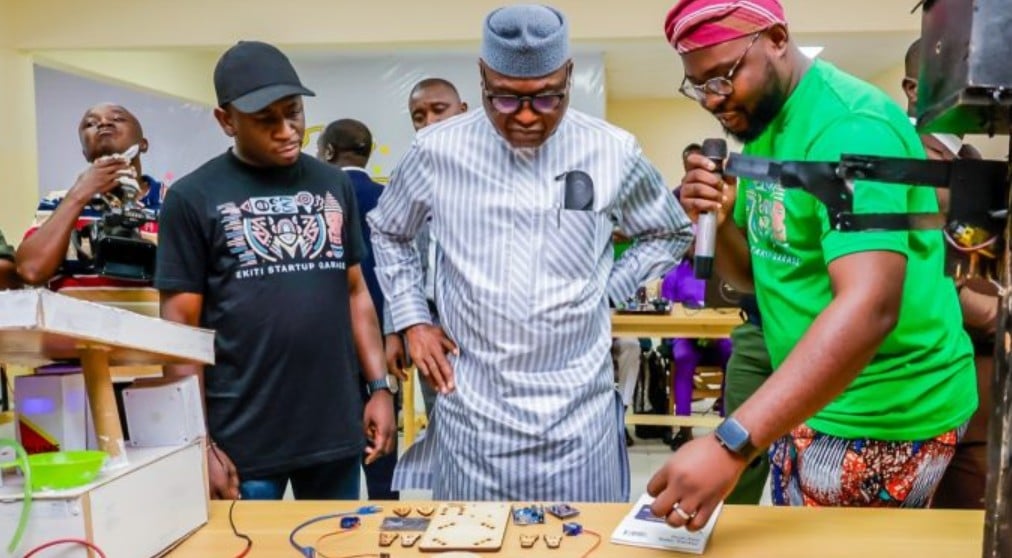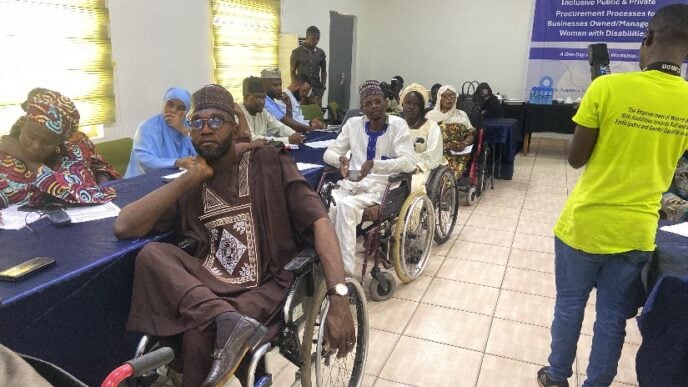BY SEUN FAKUADE
Two years ago, when Governor Biodun Oyebanji created the ministry of innovation, science, and digital economy (MISDE) in August 2023, sceptics questioned whether a traditionally agricultural state could become a technology hub. Today, Ekiti state stands as proof that with strategic vision and systematic execution, any Nigerian state can build a thriving innovation ecosystem.
The numbers speak for themselves. In 23 months, we have funded eight startups through our Young Innovation Programme and RAVE initiatives, attracted two new tech hubs to the state, and launched Nigeria’s first makerspace focused on robotics and 3D printing. Our robotic academy, established in June 2025, has already graduated 400 students from primary and secondary schools using our adaptable Train-the-Trainers curriculum model designed for scalability and sustainability.
Perhaps most telling is the success of Team Savvy, three young innovators whose journey exemplifies our systematic approach. Favour Adebayo was discovered at Ekiti State Government College in October 2023, showcased at our Innovation Summit, and then mentored through our internship scholarship program with the Cybernetiq team at the Startup Garage. Their fintech solution “Splitwise” won ₦5 million at the HabariPay Squad Hackathon 2.0, demonstrating that world-class innovation can emerge from strategic government investment in youth talent.
Advertisement
We completed five of our 81 Digital Public Infrastructure projects, with MISDE becoming the first ministry in Ekiti State to fully digitize its operations on May 1, 2024. This wasn’t just symbolic; we chose to lead by example, proving government efficiency is achievable before mandating change across other agencies.
Building from First Principles
Our success stems from recognizing a fundamental truth: innovation ecosystems cannot be imported wholesale. They must be built systematically, addressing education, infrastructure, funding, regulation, and culture simultaneously. This insight shaped our comprehensive Innovation Strategy Blueprint, which guides every initiative we undertake.
Advertisement
Consider our approach to education. Rather than simply adding technology to existing curricula, we created the STEAM Bootcamp foundries for primary and secondary schools, introducing young minds to hands-on problem-solving from an early age. The Fountain Whiz mathematical bootcamp ensures students develop analytical capabilities essential for data science and mathematical computing. By July 2025, these programs had reached hundreds of students across public and private schools.
To ensure sustainability beyond government funding, we developed adaptable curriculum workbooks that enable our Train-the-Trainers model. This strategic approach means local educators can continue delivering high-quality STEM education even as programs scale across communities. Our summer initiative, implemented in partnership with Innovate Ekiti, has already attracted over 200 young participants, demonstrating how public-private collaboration can amplify impact.
The Ekiti StartUp Garage exemplifies our infrastructure philosophy. As Nigeria’s first makerspace with robotics, 3D printing, and prototyping tools, it removes traditional barriers between ideas and reality. Entrepreneurs can now move rapidly from concept to prototype without leaving the state. The UNDP has committed additional support for this initiative, recognizing its potential for replication across West Africa.
Strategic Policy Innovation
Advertisement
Building an innovation ecosystem requires more than programs; it demands supportive policy frameworks. The State Executive Council has approved our comprehensive StartUp Bill, creating clear legal frameworks that reduce bureaucratic friction for entrepreneurs. Our Ekiti State ICT Policy integrates AI governance for the public sector, positioning us ahead of most Nigerian states in addressing technological governance challenges.
These policy innovations reflect our understanding that government’s role is not to pick winners, but to create environments where innovation can flourish. By establishing clear regulatory frameworks and reducing uncertainty, we enable entrepreneurs to focus on building rather than navigating bureaucracy.
The Power of Partnerships
No state can build an innovation ecosystem in isolation. Our partnerships with Innovate UK, UNDP, and local organizations like Innovate Ekiti have been crucial to our success. These collaborations provide not just funding, but access to global best practices and international networks that help our startups compete globally.
Advertisement
Our quarterly “Tech Hangout” program demonstrates how ecosystem building requires consistent engagement beyond formal initiatives. These gatherings create informal networks that often prove more valuable than structured programs, enabling entrepreneurs to share knowledge, form partnerships, and support each other’s growth. It’s in these spaces that connections like Favour Adebayo’s mentorship with the Cybernetiq team often begin, showing how sustained community building creates pathways for individual success.
Measuring What Matters
Advertisement
We track specific metrics that reflect real economic impact: jobs created, businesses launched, students trained, and infrastructure deployed. This data-driven approach ensures accountability while providing evidence for continued investment in innovation initiatives.
The 400 students who graduated from our robotic academy represent more than educational achievement; they embody Ekiti’s future workforce, prepared for jobs that don’t yet exist. Our eight funded startups demonstrate that viable businesses can emerge from systematic support rather than hoping for spontaneous entrepreneurship. Most importantly, success stories like Team Savvy prove that the pathway from discovery to national recognition works when supported by comprehensive ecosystem thinking.
Advertisement
When we became the first ministry in Ekiti State to fully digitize our operations, we demonstrated that government efficiency isn’t just an aspiration but an achievable reality. This practical proof-of-concept gave us credibility when advocating for broader digital transformation across state agencies.
The Broader Implications
Advertisement
Ekiti’s transformation offers lessons that extend far beyond our state boundaries. With Nigeria’s youth unemployment at 42.5% and the tech sector contributing only 1.4% to GDP, there is enormous potential for growth. States that act strategically can capture disproportionate value from the global shift toward digital economies.
Our success challenges the assumption that innovation requires megacities or massive resources. What it needs is strategic thinking, systematic execution, and sustained commitment to building foundational capabilities. The Ministry of Innovation, Science, and Digital Economy has demonstrated that any state can become competitive in the global digital economy.
Looking Ahead
As we enter our third year, MISDE has identified strategic funding requirements of over N58 billion to fully implement our digital infrastructure masterplan. This investment encompasses comprehensive fiber optic deployment, expanded skills development programs, and Digital Public Infrastructure that will serve as the foundation for decades of growth.
We are actively seeking partnerships with global technology leaders, international institutions, and private sector partners who share our commitment to transformative change. The scale of our vision requires collaboration, but our track record demonstrates that these investments will generate significant returns.
A Challenge to Leadership
The transformation of Ekiti State from an agricultural center to an emerging innovation hub proves that Nigerian states can be proactive in shaping their economic futures. We have demonstrated that with the right approach, systematic execution, and sustained commitment, any state can build thriving innovation ecosystems.
Governor Oyebanji’s vision, implemented through strategic government action, has reshaped not just our economy but our citizens’ aspirations. Young people now see technology as a pathway to prosperity without leaving home. Entrepreneurs view Ekiti as a place where ideas can become reality. Investors recognize our state as a serious player in Nigeria’s digital transformation.
The tools for building innovation ecosystems are available. The strategies have been proven effective. The time for action is now. The only question remaining is which leaders will be bold enough to follow Ekiti’s example and transform their states into engines of innovation and growth.
Nigeria’s future depends not on hoping for external solutions, but on states taking ownership of their economic destinies. Ekiti State has shown the way forward. The time has come for others to follow.
Seun Fakuade is the commissioner for innovation, science and digital economy, Ekiti tsate. He previously served as special adviser on governance, reforms and innovation to Governor Oyebanji and has over ten years of experience in public policy and digital transformation.
Views expressed by contributors are strictly personal and not of TheCable.









